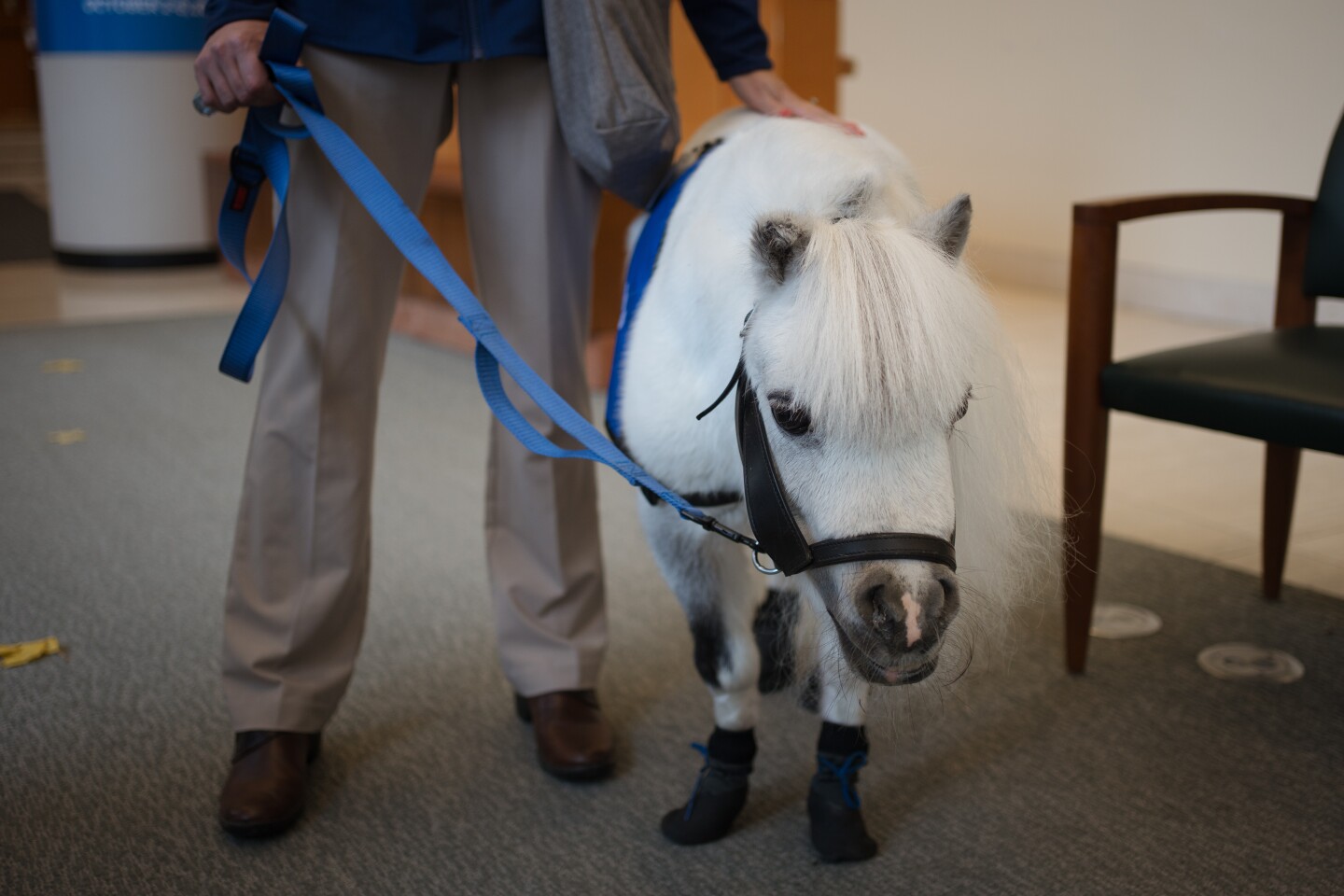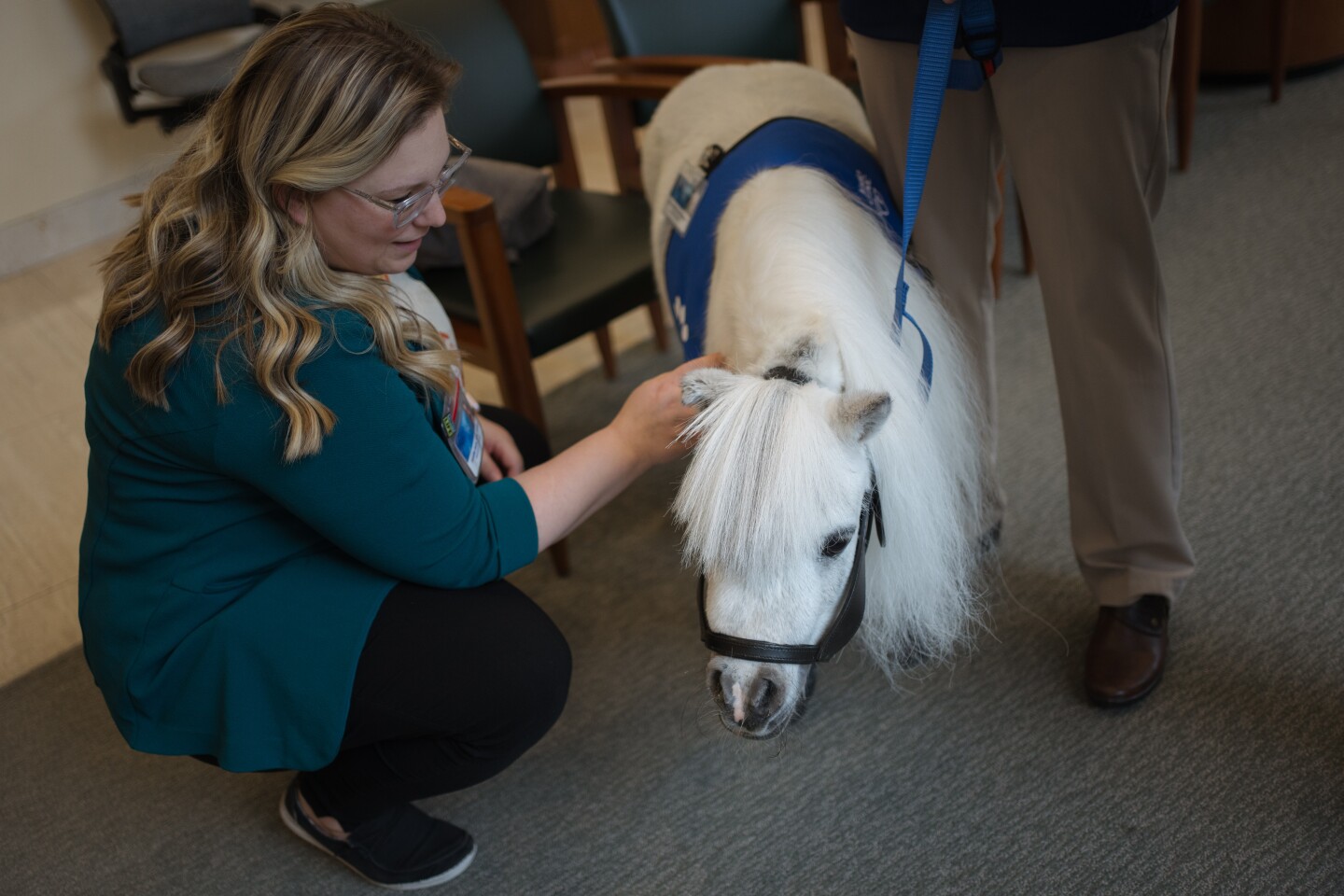ROCHESTER — Every once in a while, a notable celebrity will appear on Mayo Clinic's campus in downtown Rochester. But when Munchkin shows up, Whitney Romine says "it's like bringing a rock star into the building."
"The response has been very exuberant," said Romine, Mayo Clinic's Animal-Assisted Services coordinator. "There is a little bit of (an) element of novelty to it."
ADVERTISEMENT
At 2 feet, 5 inches tall, and 115 pounds with a white coat, mane and tail, Munchkin the miniature horse is the first equine therapy animal to volunteer at the Mayo Clinic Hospital campus. (Another mini horse, Baron, currently visits Mayo Clinic Hospice residents.)
Munchkin's owner, Amanda Peters, has had him since he was 3 months old.
"He came to live with us with his mom, who was actually a registered therapy horse in a different state," Peters said. "He was about 25 pounds when we first got him."
Munchkin has dwarfism, which means he's a few inches shorter than other mini horses and his legs aren't straight. This impacts his ability to stay balanced and jump.
"He has a little bit of an underbite, which makes it a little harder for him to chew food," Peters said. "It also makes him look like he's smiling, so that's kind of fun."
Munchkin isn't new to volunteering — he's worked as a registered therapy animal since the age of 2, visiting people at the Zumbrota Public Library and Intermediate �������� District in Rosemount. He even has a a and

"We train them like you would at home with a dog," Peters said. "You reward them with lots of praises for doing what you want them to do, you expose them to a lot of people, a lot of different noises and sounds."
ADVERTISEMENT
When Peters and Munchkin needed to be re-evaluated by Pet Partners, a therapy animal registration organization, earlier this year, they needed a nearby place to do the evaluation.
"I'm a licensed Pet Partners evaluator," Romine said. "One of the evaluators from the Twin Cities reached out to me. ... She was asking if there was a location that the evaluation can be completed."
Romine rented out a conference room in Mayo Clinic's 41st Street Professional Building, and she sat in on Munchkin's re-evaluation.
"He was just a spectacular horse," Romine said. "It was pretty impressive to watch him go through all the exercises, the cues, the different role-play scenarios that simulate what they might experience when they're volunteering."
Romine asked Peters if she would be interested in volunteering in a hospital, and after the right approvals were in place, Munchkin made his debut visit in a Saint Marys campus courtyard in September.
"It was really funny to watch people walking by the glass and you saw the 'Is that a horse?' question, where they're just staring through the glass," Romine said. "I waved them over: 'Come on over, Munchkin's part of our caring equines, he's a therapy animal.' ... You just watch their faces light up like I just handed them Christmas morning."
This positive impact on others can help patients and their families have some respite during a potentially distressing and scary time. Dr. Brent Bauer, director of research for Mayo Clinic's Integrative Medicine Program, said that kids and adults who interact with therapy animals experience lower blood pressure and improved sleep.
ADVERTISEMENT

"There's science here, but there's also humanity, right?" Bauer said. "I can tell you lots of studies on blood pressure responses, cortisol responses, anxiety responses, and those are super important. But at the end of the day, sometimes it's just that simple fact of walking down the hall and watching what happens to patients and nurses and doctors and other staff members, and you immediately see that there's something more here."
Therapy dogs can help some patients in more active roles. Romine said health care providers can use these dogs for motivation and support in goal-directed activities, like helping patients stand, walk and build stability. Right now, some volunteer dog/handler teams are currently participating in an animal-assisted therapy study with patients going through occupational or physical therapy.
"The research coordinator has told me so many stories about patients who got up for the first time out of their wheelchair for the dog that was involved in their therapy," Romine said. "I hear a lot of 'This is the first time they've smiled.' Those are pretty powerful stories."
Demand for therapy animal interactions is high, so Romine is of registered therapy dogs. In addition to Munchkin, there are 36 dog/handler teams that visit Mayo Clinic at least once a month. Her goal is to get 100 teams involved.
"There really is no better form of connection than interaction with therapy animals," Romine said. "It's the instant icebreaker."










